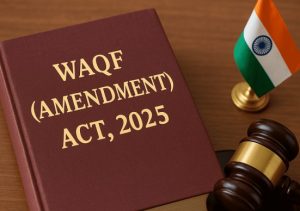Waqf row: Can’t order ‘blanket’ stay on law by Parliament when validity presumed, Centre tells SC

New Delhi: The Centre Friday sought the Supreme Court to dismiss the pleas challenging validity of the Waqf (Amendment) Act, 2025 and said there cannot be a blanket stay on the law as there was a presumption of its constitutionality.
In a 1,332-page preliminary counter affidavit, the government defended the contentious law saying that shockingly after 2013, there were an addition of over 20 lakh hectare (precisely 20,92,072.536) in waqf land.
Right before even Mughal era, pre-independence era and post-independence era, the total of waqfs created was 18,29,163.896 acres of land in India, the affidavit said.
It claimed to report misuse of earlier provisions to encroach upon private and government properties.
The affidavit was filed by Shersha C Shaik Mohiddin, joint secretary in the Ministry of Minority Affairs.
The settled position in law is that constitutional courts would not stay a statutory provision, either directly or indirectly, and will decide the matter finally. There is a presumption of constitutionality that applies to laws made by Parliament, it added.
The Centre went on, While this court would examine these challenges when the cases are heard, a blanket stay (or a partial stay) without being aware of the adverse consequences of such an order in a generality of cases (even on members of the Muslim community itself) were the petitions to be unsuccessful would, it is submitted, be uncalled for, especially in the context of the presumption of validity of such laws.
The affidavit said the pleas challenging the Act proceeded on the false premise that amendments take away fundamental rights of religious freedom.
It said the court can review a law on the grounds of legislative competence and violation of fundamental rights under Article 32 of the Constitution.
The government said the amendments were undertaken after a very comprehensive, in-depth and analytical study by a parliamentary panel having members from major political parties.
Parliament has acted within its domain to ensure that religious endowments like waqf are managed in a manner that upholds the trust reposed in them by the faithful and the society at large, without trespassing on religious autonomy, it said.
The law, the Centre said, was valid and the result of a lawful exercise of legislative power.
The affidavit said replacing the legislative regime, enacted by the legislature, was impermissible.
On April 17, the Centre had assured the top court that it would neither denotify waqf properties, including waqf by user, nor make any appointments to the central waqf council and boards till May 5.
A bench headed by Chief Justice Sanjiv Khanna is slated to hear the matter May 5 on the passing of interim orders.
PTI
News